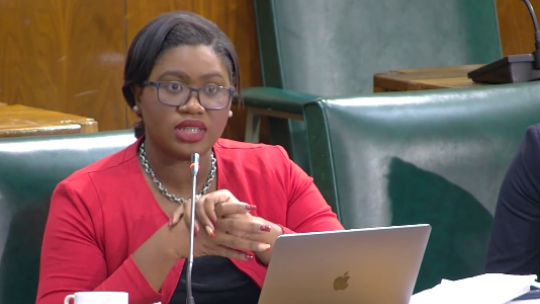.png)
00:00
00:00
00:00
JFJ Executive Director Mickel Jackson
Human rights lobby group, Jamaicans for Justice (JFJ), is insisting that the existing sentencing and parole mechanism for minors found guilty of capital murder should be maintained.
This is in response to Justice Minister Delroy Chuck's announcement in the House of Representatives on Tuesday in relation to further amendments to the Child Care and Protection Act.
The Minister said the changes proposed that a child found guilty of capital murder be sentenced to life in prison or no less than 30 years and be eligible for parole after serving 15 years.
The adjustment represents a five-year reduction when compared with the initial proposal of 20 years, before being eligible for parole.
Assessing the changes while speaking with Radio Jamaica News, JFJ Executive Director Mickel Jackson described the proposed amendments as immoderate.
"The first iteration of the bill had section 78, subsection 3 of the Child Care and Protection Act being done away with, which was a section that dealt with judicial discretion in terms of how judges can vary away and impose just sentences for children who are facing the courts for murder. But we note that it's twofold, where in one instance, I believe it is capital murder, the judge must impose the mandatory minimum sentence, but in non-capital murder, the judge would have that discretion to vary and to impose a sentence that the court sees fit. We believe that generally when it comes to child justice matters, the full discretion should be within the remit of the courts," she argued.
Ms. Jackson described the proposed move to implement mandatory minimum sentences or parole eligibility period for children as a bad policy and legislative decision.
The JFJ Executive Director believes the proposed changes, as outlined in the Criminal Justice Administration Amendment Act and Offences Against the Person Amendment Act, could have dire consequences for the prison system. She said despite the reduction in sentencing and parole periods for adults, the move could create more problems.
"It will worsen the prison overcrowding challenges that we have, and it undermines the principle of rehabilitation and child justice. While we welcome the reduction in some of the excessive mandatory minimums which were set for capital and non-capital murder, the challenge that JFJ is having, and we hope that the Senate will accept, is the inclusion of a safety valve, which is still maintaining some judicial discretion where the courts can look at matters on a case-by-case basis and note that while you may have a mandatory minimum set, if in a particular matter you believe that justice would be best served to divert from the mandatory minimum, the judge will have the discretion to do that."
The proposed changes to the Offences Against the Person Act are for the mandatory minimum penalty for a conviction of non-capital murder to be lowered to 30 years instead of 45. And where a term of years has been imposed, the period that must be served before becoming eligible for parole is proposed to be 20 years instead of 35.
Meanwhile, the proposed amendment to increase the terms of years deemed as life in prison remains at 50 years under the Criminal Justice Administration Act.
Minister Chuck said the bills represent a necessary and deliberate response to the levels of violent crime in Jamaica, particularly those involving the most heinous offence, murder.










 All feeds
All feeds







